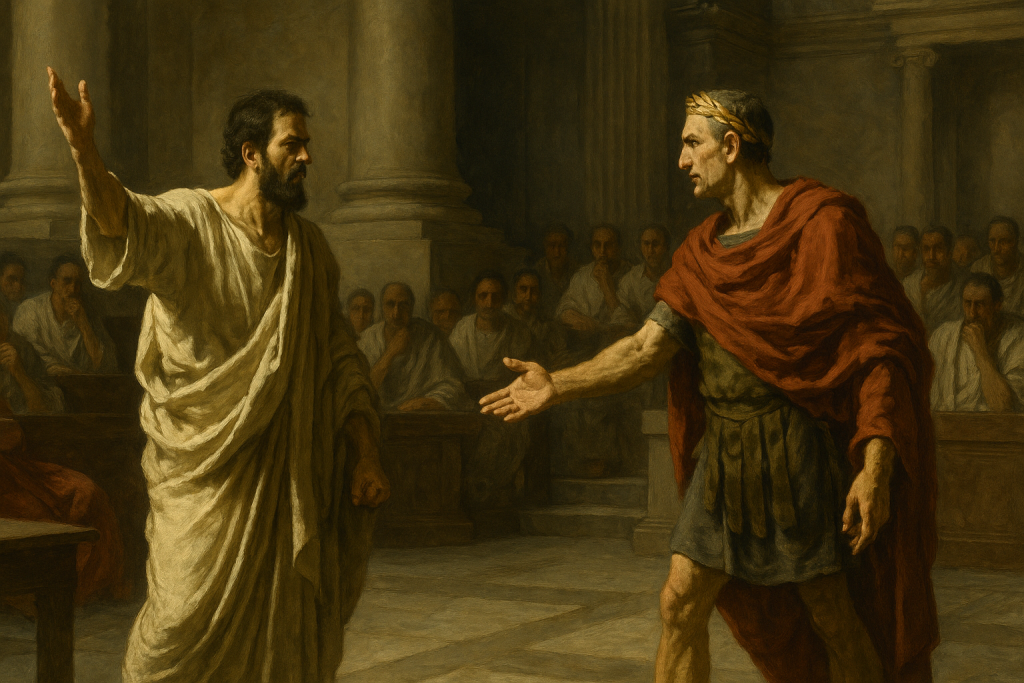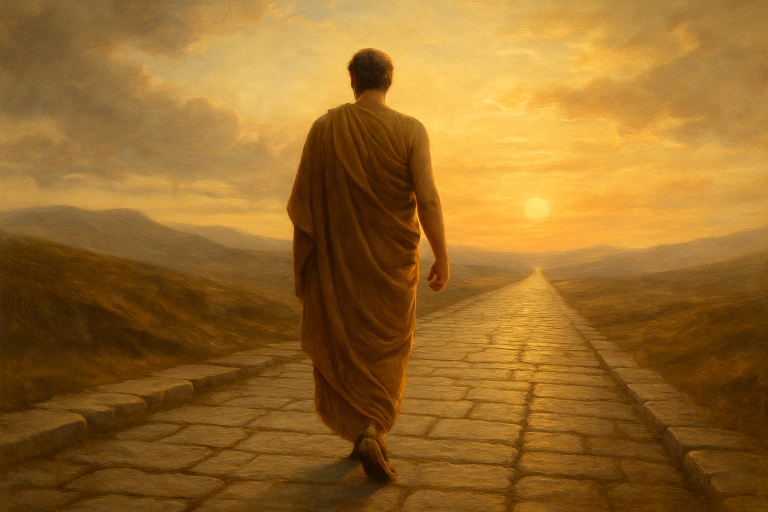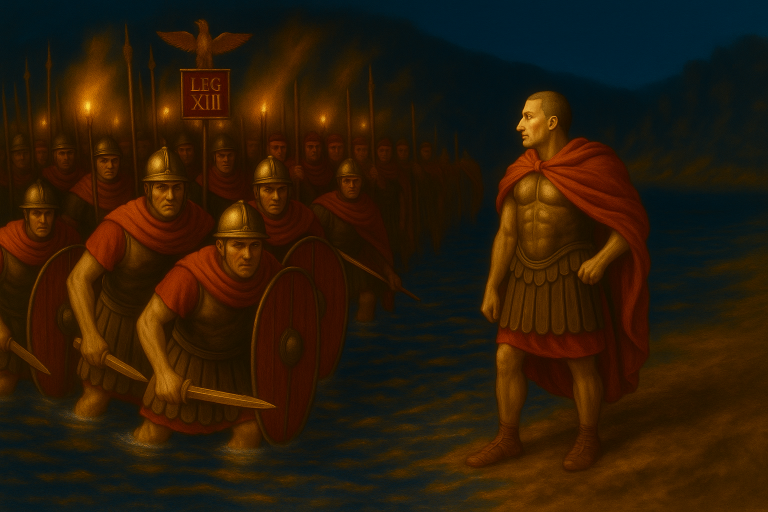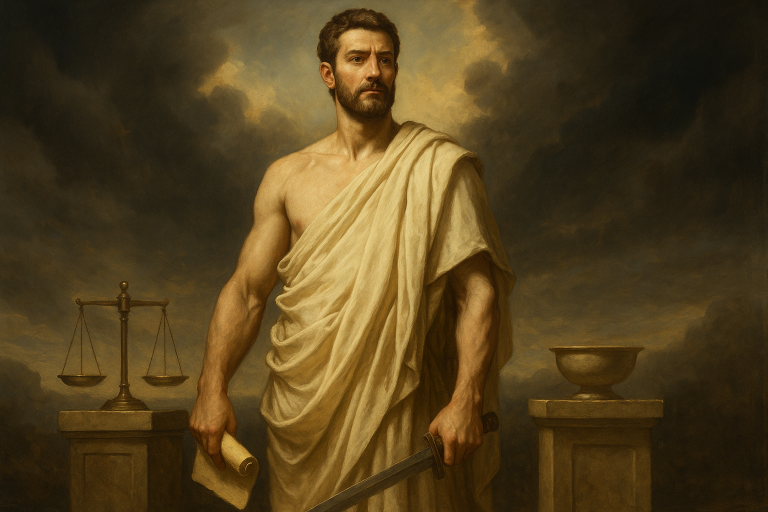Cato the Younger · The Last Roman Republican’s Stand Against Caesar

Utica, 46 BCE
The war was over. At Thapsus, Caesar had crushed the last resistance of the republicans. In North Africa, his legions marched with unstoppable weight, carrying the certainty of empire on their standards. In the coastal city of Utica, a few remnants of the cause gathered—fugitives, soldiers, senators. They knew no rescue was coming. Rome’s liberty had ended, and the world now belonged to Caesar.
Cato the Younger, the man who had stood longest against him, remained calm. He had spent a life fighting corruption, resisting expediency, and clinging to the austere ideals of the old republic. He was not a philosopher by profession, but no Roman embodied Stoicism more fully in practice. And now, as the walls closed in, he prepared for the end.
On the night before his death, Cato dined with friends. He spoke not of despair but of philosophy. When others collapsed in fear, he sought clarity. After supper, he withdrew to his chamber and read Plato’s Phaedo, the dialogue on the immortality of the soul and the death of Socrates. By the flicker of lamplight, he studied the words of another man condemned by the state yet unbroken by it.
Utica was silent under Caesar’s shadow. But in that silence, one man’s defiance still mattered. Cato’s decision in those hours was not about strategy or politics. It was about something deeper—the conviction that virtue is the only true good, and that nothing, not even the ruin of the republic, could make him abandon it.
The Making of an Idealist
Cato was born into privilege in 95 BCE, the great-grandson of Cato the Elder, Rome’s legendary champion of traditional values. He inherited wealth, noble blood, and the weight of a family name that demanded excellence. But when he was young, both parents died, and he was raised in the household of his uncle, Marcus Livius Drusus. There, surrounded by political intrigue and senatorial ambition, he learned that Rome’s institutions were crumbling under the pressure of men who put personal power above public good.
He could have joined them. Most did. The Late Republic offered endless opportunities for a young aristocrat to enrich himself through provincial governorships, military commands, or simple bribery in the Forum. Instead, Cato turned in the opposite direction. He wore the plainest woolen cloak while others draped themselves in expensive purple. He walked barefoot through Rome’s streets while senators rode in litters. He ate simple meals when he could have feasted. These were not eccentricities but declarations—visible rejections of the luxury that had made Rome’s elite soft and corruptible.
When he entered the Senate, he brought this same severity to politics. He refused bribes in an environment where bribes were standard procedure. When legislation reeked of corruption, he filibustered for hours, standing and speaking until his voice gave out or the Senate adjourned in exhaustion. He walked out of banquets when he saw money changing hands under the table. Once, when offered a lucrative governorship of Cyprus, a position that would have made him immensely wealthy, he accepted it only to execute it with scrupulous honesty, returning to Rome with detailed accounts and not a single denarius more than his official salary.
His colleagues found him insufferable. He blocked deals, exposed schemes, and voted against measures that everyone knew would pass anyway. But even his enemies could not question his integrity. Cato had made himself politically impotent by refusing to play the game, yet in doing so, he had become morally unassailable. His reputation for incorruptibility became legendary, a standing rebuke to everyone around him.
The difference was not that Cato studied philosophy—many aristocrats did, hiring Greek tutors and reading Stoic texts as a mark of cultivation. The difference was that he lived it. Every decision passed through a single filter: Is this virtuous? Not expedient, not profitable, not politically advantageous. Virtuous. And when the answer was no, he refused, regardless of the cost.
This made him ineffective as a politician in the traditional sense. He won few votes, changed few minds, built no lasting coalition. But effectiveness was not his goal. Consistency was. By the time Caesar rose to challenge the republic, Cato had spent twenty years proving that one man could live by principle in the most corrupt city in the world. That proof would become the foundation of his final stand.
The Caesar Problem
Caesar was not a sudden threat. He emerged gradually, brilliantly, through a series of calculated moves that each seemed reasonable in isolation but together revealed a pattern. In 60 BCE, he formed the First Triumvirate with Pompey and Crassus—a private agreement among three powerful men to dominate Roman politics. It was not technically illegal, but it bypassed the Senate and concentrated power in a way that made a mockery of republican government.
Cato saw it immediately. While others dismissed the alliance as temporary or manageable, he recognized it as conspiracy. Three men controlling Rome meant the republic was already dead in practice, even if the forms remained. He opposed them at every turn, speaking against their legislation, blocking their appointments, and warning anyone who would listen that this concentration of power would end in tyranny.
When Caesar became consul in 59 BCE, he governed with open contempt for Senate procedures. He pushed through laws by intimidation and mob violence. He secured for himself a five-year command in Gaul, a military appointment that would give him legions, wealth, and glory. Cato tried to stop it. He stood in the Forum and spoke until Caesar’s supporters physically dragged him away. It did not matter. Caesar marched north to Gaul, and for the next nine years, he waged war, conquered territory, and sent back rivers of gold that made him the richest and most popular man in Rome.
Cato watched it all with grim clarity. Caesar was not just a successful general. He was dismantling the republic piece by piece, replacing law with personal power, tradition with ambition. When Caesar’s command in Gaul was ending, Cato argued that he should be prosecuted for his illegal acts as consul. But by then, Caesar was too powerful to touch. Prosecution would mean civil war, and most senators preferred accommodation to conflict.
In 49 BCE, Caesar crossed the Rubicon with his army, an act of open rebellion. The Senate fled. Pompey, once Caesar’s ally, now led the republican resistance, and Cato joined him—not out of love for Pompey, who had his own ambitions, but out of loyalty to the institutions Pompey at least claimed to defend. The choice was impossible. Defend the republic with men who had helped destroy it, or let Caesar take it unopposed. Cato chose the former, knowing the contradiction, accepting it as the only option left.
The war went badly. At Pharsalus in 48 BCE, Caesar crushed Pompey’s army. Pompey fled to Egypt and was murdered. The republican cause collapsed, but Cato would not surrender. He retreated to North Africa with the surviving forces, determined to fight on even when the outcome was certain. For two more years, he held out, not because he believed he could win, but because surrender meant acknowledging Caesar’s authority.
At Thapsus in 46 BCE, Caesar delivered the final blow. The republican army shattered. Survivors scattered. Cato withdrew to Utica, a coastal city where the last remnants of the cause gathered to await Caesar’s arrival. The war was over. Everyone knew it. And Caesar, magnanimous in victory, sent word that he would pardon those who submitted.
For Cato, the offer was worse than a death sentence. Pardon required submission. It required acknowledging that Caesar had the right to grant or withhold it. It meant living as Caesar’s subject, breathing by his permission, existing at his mercy. That was no life. That was slavery dressed in the language of clemency. Cato had spent decades refusing to live under any man’s power. He would not start now, even to save his life.
The choice clarified. Accept Caesar’s pardon and live without freedom, or reject it and die with integrity intact. For a Stoic, the answer was obvious. Survival was not the highest good. Virtue was. And virtue demanded that he refuse.
The Last Night
Cato spent his final day as he had spent most of his life—serving others. He organized the evacuation of those who wanted to flee before Caesar arrived. He settled debts, paid what he owed, ensured that those who had followed him would not be abandoned. He spoke with his son, Marcus Porcius Cato, urging him to live honorably under Caesar’s rule if he must, but never dishonorably. Better to die with integrity than survive in compromise.
That evening, he dined with friends. They expected anguish or panic. Instead, they found him calm, engaged in philosophical debate. He discussed Stoic doctrine, the nature of virtue, the indifference of external circumstances. His composure unsettled them. Some thought he had accepted Caesar’s pardon. Others worried he had lost his grip on reality. None suspected what he planned.
After dinner, he withdrew to his chamber. A slave brought him Plato’s Phaedo, the dialogue he had read many times before. The choice was deliberate. The Phaedo recounts the final hours of Socrates, the philosopher condemned by Athens for corrupting the youth and disrespecting the gods. Socrates refused to escape, refused to beg for mercy, and drank the hemlock calmly, arguing that death was either a dreamless sleep or a passage to another realm—and either way, nothing to fear.
The parallel was exact. Socrates had chosen death over injustice. Cato would do the same. He read by lamplight, following Socrates through the arguments about the immortality of the soul, the philosopher’s duty to truth, the courage required to face the end without flinching. When he finished, he set the scroll aside and called for his sword.
A slave brought it. Cato tested the blade, found it satisfactory, and dismissed everyone. Then he lay down and struck. The wound was deep, but not immediately fatal. When his household heard the noise and rushed in, they found him unconscious, bleeding. A physician bound the wound, and for a moment, it seemed he might survive.
Cato regained consciousness. He saw the bandages, realized what had happened, and without a word, tore the wound open with his own hands. The blood came fast. There was no stopping it this time. By morning, he was dead.
His friends found him in the chamber, Plato’s dialogue still nearby, the lamp burned down to nothing. Outside, Caesar’s legions approached. But they would find no republican senators waiting to submit. Cato had denied Caesar the satisfaction of clemency, the propaganda victory of a pardoned enemy. His death was his final act of defiance—absolute, irreversible, and entirely his own.
Caesar, when he heard the news, reportedly wept and said, “Cato, I begrudge you your death, as you begrudged me the preservation of your life.” It was as close as Caesar came to admitting defeat. He could conquer armies, defeat generals, and bend the Senate to his will. But he could not conquer Cato. One man, armed with nothing but conviction, had escaped his grasp entirely.
Philosophy Tested
For decades, Stoics had taught that virtue was the only true good, that external circumstances were indifferent, that a wise man remained free regardless of fortune. Cato’s death proved the doctrine was not merely theoretical. It could be lived, even to the end.
The Stoic worldview divided all things into three categories: good, bad, and indifferent. Virtue—acting with justice, wisdom, courage, and temperance—was the only good. Vice was the only bad. Everything else—wealth, health, reputation, even life itself—belonged to the indifferent category. These things might be preferred or avoided, but they could not make a person truly good or bad. Only one’s choices did that.
Cato had internalized this framework completely. Life was indifferent. Caesar’s pardon was indifferent. What mattered was whether he acted virtuously in the face of them. And virtue, in this circumstance, meant refusing to live as Caesar’s subject. So he refused, accepting the loss of life as the price of maintaining integrity.
The death reverberated through Roman culture. Cicero, the great orator and philosopher, wrote a eulogy praising Cato’s stand, though the text has been lost. Later Stoics—Seneca, Epictetus, Marcus Aurelius—all pointed to Cato as the embodiment of their philosophy. He was not just a man who studied Stoicism. He was Stoicism incarnated, the proof that the doctrine could be lived fully even when it demanded everything.
The influence stretched beyond Stoicism. During the Renaissance, when city-states revived republican ideals, Cato became a symbol of resistance to tyranny. Writers and political thinkers invoked his name as shorthand for principled defiance. Dante, writing the Divine Comedy, placed Cato as the guardian of Purgatory—a remarkable honor for a pagan who had committed suicide, acts that should have condemned him in Christian theology. But Dante understood what Cato represented: the soul that values freedom above life itself.
Yet Cato’s stand carried costs beyond his own death. His refusal to compromise made republican unity impossible. Some historians argue that his rigidity hastened Rome’s collapse, that a more flexible leader might have found middle ground with Caesar and preserved some form of constitutional government. Perhaps. But that criticism misses the point. Cato was not trying to win. He was trying to remain himself. For him, survival through compromise was a loss greater than death. The republic as he understood it—a government of laws, not men—was already dead. What remained was whether he would live as if it still existed, or bend to the reality that power had replaced principle.
He chose not to bend. And in that choice, he demonstrated something the pragmatists could never grasp: that some things are worth losing everything to keep.
Why It Still Cuts
Cato died more than two thousand years ago, but his choice remains uncomfortable because it exposes a question most people spend their lives avoiding: What are you willing to lose everything for?
We admire Cato in the abstract. We praise his integrity, his refusal to compromise, his willingness to die rather than submit. But admiration is easy when it costs nothing. The harder question is whether we live by the same principles. And for most people, the answer is no.
Modern life is built on compromise. We negotiate, accommodate, and adjust our positions to fit circumstances. This is not inherently wrong. Flexibility allows us to navigate complex situations, maintain relationships, and avoid needless conflict. But there is a difference between tactical flexibility and moral surrender. Cato’s life asks where that line is, and whether we know when we have crossed it.
The uncomfortable truth is that most people never face Cato’s test. We will not be asked to choose between death and dishonor. But we face smaller versions of the same choice constantly. The moment when telling the truth will cost us professionally. The decision to act justly when silence would be easier. The refusal to go along with something wrong because everyone else is doing it. These are the places where Cato’s example becomes relevant.
His answer is uncompromising. Integrity is not negotiable. A person can lose wealth, status, friends, career, even life, but they cannot lose virtue without surrendering it. And once surrendered, nothing remains worth keeping. This is a hard teaching. It offers no assurance that doing the right thing will work out well. It promises only that failing to do the right thing will hollow you from the inside until nothing of substance remains.
The modern world resists this claim. We are taught that survival is the highest good, that living to fight another day is wisdom, that pragmatism excuses almost anything. But Cato would say those are the excuses of people who have already decided to compromise and are looking for reasons to feel good about it. Real freedom, he would argue, is not living without constraints. It is refusing to be constrained by anything except your own commitment to virtue.
Caesar conquered Rome. He reshaped the republic into an empire that would dominate the Mediterranean for centuries. His name became a title—Kaiser, Czar, Caesar—synonymous with absolute power. Yet when people remember that era, they remember Cato too. Not because he won, but because he would not lose himself. His defeat became a different kind of victory, one that could not be taken by force because it existed entirely within his own will.
In the chamber at Utica, the lamp burned low. Plato’s dialogue lay open beside a man who had read it knowing what it meant to follow Socrates’ example. Cato had spent his life proving that one person could live by principle in a world that rewarded corruption. In his death, he proved something more: that when everything else is stripped away—power, safety, life itself—the one thing that remains is the choice to act with integrity or to surrender it.
Rome buried another senator. But the argument Cato made with his death did not stay buried. It outlived Caesar’s empire, outlived the collapse of Rome, and speaks still to anyone who wonders what it means to live free. The answer is not comfortable. Freedom is not doing what you want. It is refusing to do what you know is wrong, no matter the cost. And when the cost is everything, that refusal becomes the only victory worth claiming.
The question he leaves is not whether you would die for your principles. Few people ever face that test. The question is whether you are living according to them right now, in the small choices that no one sees, the compromises that seem harmless, the moments when convenience wars with conscience. Cato’s life, and his death, suggest that those moments matter more than we want to admit. Because the person who compromises in small things will compromise in large ones when the pressure comes. And the person who holds the line when it costs little will know how to hold it when it costs everything.






